
Recently on Cyclingnews.com |
An interview with Eddy Merckx, February 4, 2004
The One and Only
In his home country, Belgium, Eddy Merckx is considered as more than an icon. As the most successful bike racer of all time, he is more like an amalgam of Babe Ruth and Michael Jordan. Simply put, Eddy is the greatest sportsman ever in the land of the Flemings and Walloons. Cyclingnews European editor Tim Maloney spoke to Eddy in his modern bike factory built in a converted dairy barn in the farmland just north of Brussels on a cold, wet winter day.
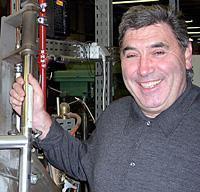
|
Cyclingnews: Eddy, we saw some pictures of you scuba diving a few months ago in Curacao at the UCI World Cup party sponsored by Amstel beer.
Eddy Merckx: Yeah, it was the first time! I'd never done it before and the director of Amstel invited me. He's a Belgian guy and he said 'you have to try scuba diving.' So I tried it and it was great, fantastic. We went eight, nine meters down and it was so beautiful. I did a little school before and he went with me. We were together so it was okay; really great! I like to swim so it wasn't hard to adapt to scuba diving.
CN: How's your son Axel?
EM: He and his family have a house in Kelowna, near Vancouver in Canada where he is spending the winter and he's been training in San Diego.
CN: Tell us about your facility here.
EM: It was an old barn that we have completely re-done from the four walls and the roof, plus we've added two times the space from the original building. We have all the capabilities to build and paint bikes here. Originally we didn't paint our bikes here. In those days, we only had one model. We started in 28 March 1980, so it's been 24 years. In 2005, it will be my 25th anniversary as a bicycle builder and at the end of this year, we'll have a special model to commemorate this.
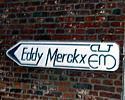
|
CN: Eddy Merckx has always been linked to top riders, beginning with your own teams like Molteni and Fiat, and also Telekom, Motorola and Lotto-Domo. Which teams will you sponsor in 2004?
EM: Of course, we'll continue with Lotto-Domo and Flanders - Afin.com this year. For the future, we hope to continue, but we're not Trek or Giant or Bianchi. We think we've made a good investment because we've won Paris-Roubaix three years in a row with Lotto-Domo. Knaven, Museeuw, Van Petegem, Tour de Flandres and not a bad total of wins. Every year since we've started in 1980, we've sponsored a pro team. Back then, we started with the Zeep Centrale team, who were sponsored by Carlos, who went bankrupt and the team didn't have bikes for the Tour de France. So we made their bikes for the Tour that year and since then, we've always been in the pro peloton. Hitachi, Panasonic, Motorola...
CN: But you raced on an Eddy Merckx bike?
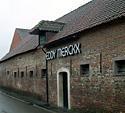
|
EM: No,no, it wasn't the same, it wasn't made by us so it wasn't an Eddy Merckx.
CN: What we understand from many top level bike builders that we talk to that the cost to sponsor the big pro teams is going up every year.
EM: We do what we can do; for example, recently a well known Spanish team director called me looking for sponsorship. We are a small company and what he was looking for was too much. I can't supply three teams with material! It's too bad, but it's just not possible.
CN: Nonetheless, you must be happy with Lotto-Domo's performance.
EM: Sure. The Paris-Roubaix / Flanders double by Van Petegem and his third place in the world championship, Robbie McEwen's performance in the Tour de France. It was a good year. Our only problem these days is that the US dollar is too low so our exports are suffering a bit.
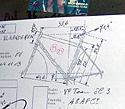
|
CN: Speaking of Peter Van Petegem, what's your perception of him as a rider?
EM: Van Petegem is a rider with a lot of talent and class who knows what he can achieve very well. He knows which races are good for him and he gives 100 percent there. The rest of the time, he prepares for the key races. He knows that if he does the Tour de France, that's not good for him. Perhaps he's not that good for San Sebastian or Lombardy, but for the rest of the World Cup races, he can win any of them. He's also a clever rider who knows his adversaries well and knows just the right time to make his move.
CN: We've seen your new carbon fibre bikes for the last few years; Axel had one at Hamilton. What's your opinion of the boom in carbon fibre bikes?
EM: Carbon fibre has its advantages and disadvantages for bicycle construction. You have to make standardized sizes, since it's expensive to make the molds. So it's much harder to build a custom-made frame. Sure that can be done with carbon fibre, but then the frame has to be glued and that's much different than a monocoque frame. But you know, carbon fibre is used in Formula One so much, because it's strong and light.
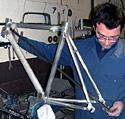
|
CN: Ernesto Colnago says that there is a lot of carbon fibre around these days of an inferior quality from Asia on the market.
EM: Yes, it's very important to distinguish the difference between the technologies. We have invested a lot in this technology, in our molds to build a high-quality monocoque carbon fibre frame in Europe.
CN: So when might we see this new bike from Cycles Eddy Merckx?
EM: Perhaps at the next trade shows this fall…we'll have to see.
CN: It's known you're good friends with Lance Armstrong. Did you see him when he was in Brussels (Dec.'03)?
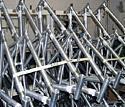
|
EM: Yes, we went to dinner and then to the (Sheryl Crow) concert together.
CN: Do you have a favorite reataurant?
EM: Piccolo Mondo. [An Italian/French restaurant in Brussels - Ed]
CN: How do you see Lance's chances to win his sixth consecutive Tour in 2004?
EM: Oh I think he's very motivated for it.
CN: So Lance was welcome in the club of riders who've won five Tours?
EM: Of course. Even if he wins six, seven... you know, cycling has changed and you can't compare it now to my day. It's certain that if I rode today, I would have ridden differently, because everything has changed. Before, you had to race a lot to make a little bit of money. You had to ride the big races to make your money in the criteriums. But now, the riders are paid better and that's changed everything.
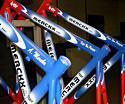
|
CN: So how do you see Lance's Tour chances?
EM: Oh, I think he's the favorite…
CN: Perhaps the Tour was harder for him last year?
EM: Well, hard or not, all the same, Lance is a complete rider, he's a professional and he knows his job very well. I think he understands what he has to do. And in any case, his adversaries are the same next year. So why not Ullrich? For example, I think the [mountain TT] l'Alpe d'Huez stage is more favorable for Lance than Ullrich.
CN: How do you assess the parcours of the 2004 Tour de France?
EM: It's almost the same every year. There are hard stages, but they're hard for everybody. I think the Tour will be open this year and that's interesting.
CN: Eddy, if you and Lance Armstrong were the same age and were adversaries in the Tour de France, how would you go about beating him?
EM: (perplexed) I can't really respond to that since we didn't really race together. There's one thing that counts, though: to win. So if Ullrich didn't win, Lance was better. Or he was more intelligent. I won the Tour Of Italy where Fuente was a better climber than me. I had to improvise, to attack at the right moment, so it's very difficult to answer that.
CN: It's just hard to imagine what it must be like to race at that level, what it takes to win a Tour de France...
EM: You have to improvise, to see where to attack your adversaries at the right moment, when they are weak... but we can't compare the different eras when I raced and when Lance raced.
CN: I've heard people say that 'the races of today aren't as good as the old days'.
EM: No, that's not true. Today's riders... a champion of yesterday will be a champion today and today's champion will be a champion tomorrow. Champion riders are similar because they have the natural physical characteristics to start with and then they have to do a lot of work. If you don't do that, you're not a champion. That's the only recipe.
See also: The five-times club: Eddy Merckx
